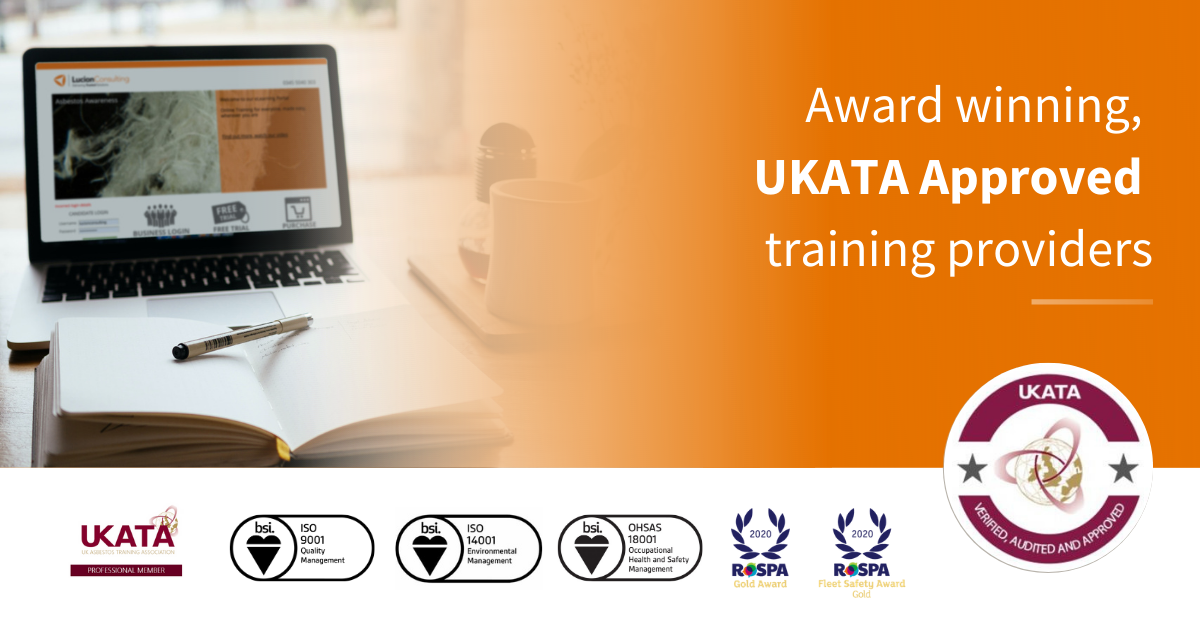Duty To Manage: COVID 19 Impacts On Asbestos Training Legal Obligations
28 September 2020
During recent interviews, UKATA’s Chief Operating Officer, Craig Evans, highlighted concerns relating to a 66% decrease in UKATA approved asbestos training courses being delivered by approved providers over the last 6 months (March-August), the lowest levels in five years.
With many offices, construction sites, and many other workplaces shut for extended periods due to the COVID pandemic, legal obligations to ensure relevant individuals are adequately trained (regardless if sites or buildings are closed) have slipped.
Do I legally have to have UKATA approved asbestos training?
Duty holders have a legal obligation to manage asbestos risks on site. In the event that a property or premise is empty, the duty to manage is placed on whoever has control of the premises at the time (often for office buildings this may be the occupier or premise owner but it is important to ensure you have read your tenancy or leasehold carefully to determine your legal obligations in the event of premises being unoccupied for extended periods of time. In public buildings often the duty will be placed upon the employer).
Ensuring that the nominated Duty Holder is suitably able to understand their obligations and responsibilities is vital to minimising the risk to individuals and the environment. Employers have a duty to ensure that the information, instruction and training given to their employees is adequate to allow them to safeguard themselves and other employees and to carry out their work with asbestos effectively. Worryingly, industry figures show the number of workers who have undertaken asbestos training since March has steeply declined and is at its lowest level for five years.
Asbestos Awareness training is a legal requirement under the Control of Asbestos Regulations 2012. Those that are working with asbestos need Non-licensed or Licensed Asbestos training depending on the tasks they are undertaking, this is also a legal requirement under CAR 2012. Those who are instructing their employees to work on the fabric of a building should also undertake these courses under CAR 2012 and may also benefit from further additional asbestos management training.
Prior to the Coronavirus outbreak, nationally an average of 18,000 workers a month completed asbestos training. Over the last six months (March-August), an average of 6,000 workers a month undertook asbestos training delivered by the UK Asbestos Training Association (UKATA)-approved training providers.
Steve Walker, Senior Consultant and Head of Expert Services at Lucion Consulting, which is a member of the UK Asbestos Training Association (UKATA) has spoken out after the association revealed that the number of construction workers who have undertaken asbestos training since March has steeply declined and is at its lowest level for five years.
Steve commented:
“In the midst of a global pandemic, organisations are understandably less organised and focusing on critical business needs. Our concern is that health and safety training is being overlooked as construction sites push to make up for time lost during the lockdown. This not only increases construction workers’ risk of exposure to deadly asbestos but also buildings’ users upon completion of works.”
Why is asbestos dangerous?
Asbestos-related health issues, such as lung cancer and mesothelioma, are not identified immediately after exposure to asbestos. It takes between 15 years and up to 60 years before deadly asbestos-related diseases present themselves.
The latency period of asbestos, coupled with a substantial drop in training numbers, could mean that the UK will be facing a greater amount of deaths from asbestos over the next 15 – 60 years. To reduce this risk, it is important that the delivery of asbestos training returns to pre-Covid levels.
Deaths from asbestos exposure have increased dramatically in the last 15 years after widespread use between the 1950s and 70s. Since 2018, there have been more than 5,000 deaths annually in the UK from asbestos-related cancers - the largest single industrial killer ever seen in the UK.
The HSE recommends that asbestos refresher training courses should be undertaken to help ensure knowledge of asbestos awareness is maintained. The asbestos regulations also make it clear that asbestos training for non-licensable and licensable asbestos works should be carried out at least annually.
Sam Pearce, consultant and training provider at Lucion Consulting added:
“It is now vitally important that all construction employers and workers ensure that all asbestos training is up-to-date. These are difficult times, but this is a matter of life or death.”
To ensure asbestos training continues to be accessible during the pandemic, UKATA approved its 200-member companies and individuals to deliver asbestos courses by video conference technology.
To find out more about Lucion’s online training courses or to book a classroom training course submit an enquiry to info@lucionservices.com or call 0345 5040 303 and ask to speak to one of our consultants today.
Tool Box Talk: Asbestos Awareness
As part of Lucion’s Take Care Be Aware initiative, we actively take care of our health and safety responsibilities, with continuous awareness of our commitments to knowledge share and educate.
In doing so we have created a ‘toolbox talk’ on asbestos awareness to raise awareness of the hazards associated with asbestos-containing materials, enabling safety professionals to share knowledge and overall save the time and effort in producing them for you and your teams.
_2.png)
Download From NexGen
Risk Assessment FAQs
Conducting your health and safety risk assessment can be a daunting task. Before you get started, read our clients' top risk assessment FAQs.
_4.png)
Download From NexGen
10 Steps To Asbestos Remediation
Puzzled by what is involved in the asbestos remediation process? Read our quick 10 step guide to your asbestos remediation project.
_1.png)
Download From NexGen


 NexGen
NexGen












